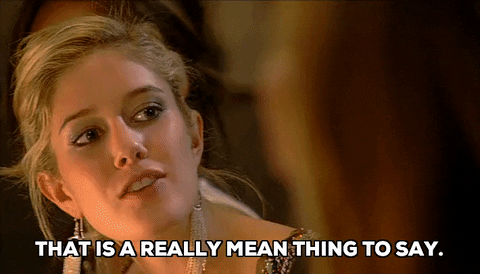Disagreements are a normal part of any relationship, but, sometimes, they can get pretty heated. It's easy to get lost in the need to be heard. It's easier to get lost in the desire to win. What might be unexpected, though, is that the real win comes through learning how to have a healthy, productive argument.
Resolution is important. It's good to find common ground and find a solution to any disagreement. But what builds strong and healthy relationships isn't outcome—it's process.

Here are five helpful ways to have a productive and relationship-building argument:
Let go of the outcome.

This may seem completely counterintuitive since the whole point of having an argument is to prove you're right, right? But when it comes to building a healthy relationship, if you can learn to let go of the outcome, you'll have a better experience working through the problem. Verywell Mind offered a very helpful way of framing an argument, noting, "While it might sound counterintuitive, fighting in love can actually be a good thing for your relationship. When you learn how to argue effectively and respectfully, it can be a way for you to learn more about each other, maintain your boundaries, and resolve issues that might affect the long-term health of your relationship."
In the least, if you're no longer fighting to win, there's immediately less pressure. You're actually fighting for the opportunity to discuss the issue. Maybe the discussion proves you're wrong. Maybe it proves you're both wrong or right. Taking advantage of the opportunity to be heard is what builds up the relationship, which leads us to the second point.
Listen.

If you're not listening to the other person, you may be arguing for the same point. The basic life principle of "Treat others as you wish to be treated" falls nicely along side, 'If you want to be heard, be willing to listen.'
A program designed to help navigate conflict at Michigan State University writes, "If we improve our personal listening and communication skills, we will better understand other’s perspectives, emotions and needs. The ability to listen and hear what another person is saying is essential to working through conflict."
You're never going to trust your partner or be trusted if you don't listen to one another.
Stay on topic. No personal attacks.

It can be easy to switch tactics and get mean or personal when navigating a challenging disagreement. Sometimes when emotion is high and we get scared, our response can be to hurt the other person. Sarcasm is actually an attack. Name calling, ridiculing, and disrespecting your partner is not winning the argument. This is simply avoidance and moving off topic.
An article about communicating through arguments better in Juice explains the importance of staying on topic. When you bring up side topics and past grievances, you only complicate and blur the conversation. It suggests a great response if one partner tries to change topic: "That's something we can talk about at some point, but let's try to resolve this first."
Own your part.

Nothing can be as damaging to a relationship as lack of trust. One thing that definitely builds trust is accountability. There is no point in having a productive disagreement if you can't be honest about what you're talking about. Otherwise, it's just an exercise of control and manipulation. I can't think of any form of healthy philosophy or therapy that suggests the best way to succeed is lying and manipulating your partner to the desired outcome.
In a recent article about accountability in relationships, The Sweet Institute writes, "Being accountable means recognizing that your actions and choices have consequences. This involves acknowledging mistakes, understanding their impact on your partner, and taking steps to make amends." Fostering trust not only enhances communication, it builds upon emotional intimacy. Having a supportive environment helps both partners thrive.
It's not your responsibility to make them understand.

This ties in with letting go of the outcome, but it's a little different. It's understanding that we are only responsible for sharing our feelings and experience, not with what lands or doesn't. Obviously, how we share matters as discussed in the concepts before. But, knowing that we are doing whatever we can to communicate our point clearly, kindly, and truthfully is our responsibility. How they take it or use the information is something we cannot control.
The Center for Therapeutic Achievement writes, "Clear communication means expressing your thoughts and feelings in a straightforward, considerate manner. Misunderstandings often arise from vague or ambiguous messages. Speaking with clarity helps ensure that both parties fully understand each other, reducing the likelihood of confusion."
Relationships can be really easy or really difficult. A lot depends on what both parties are willing to bring to the experience. If you want to build toward something that works, then work on the stuff that makes it better. If you want to pass some time or slowly degrade a relationship until it can't work, well, do the opposite of what's offered here.


















 Amoxicillin is a commonly prescribed broad-spectrum antibiotic.
Amoxicillin is a commonly prescribed broad-spectrum antibiotic.  Chart: The Conversation, CC-BY-ND
Chart: The Conversation, CC-BY-ND
 Counterintuitively, social media can make you feel more bored and lonely.
Counterintuitively, social media can make you feel more bored and lonely. Talking about what you’ve read can add a social dimension to what can be a solitary activity.
Talking about what you’ve read can add a social dimension to what can be a solitary activity. 
 Women and people of color who experience cardiac arrest are less likely to receive CPR.
Women and people of color who experience cardiac arrest are less likely to receive CPR.

 Mushrooms containing psilocybin.Photo credit:
Mushrooms containing psilocybin.Photo credit:  Woman undergoing cancer treatments looks out the window.Photo credit:
Woman undergoing cancer treatments looks out the window.Photo credit:  Friend and patient on a walk.Photo credit:
Friend and patient on a walk.Photo credit: 

